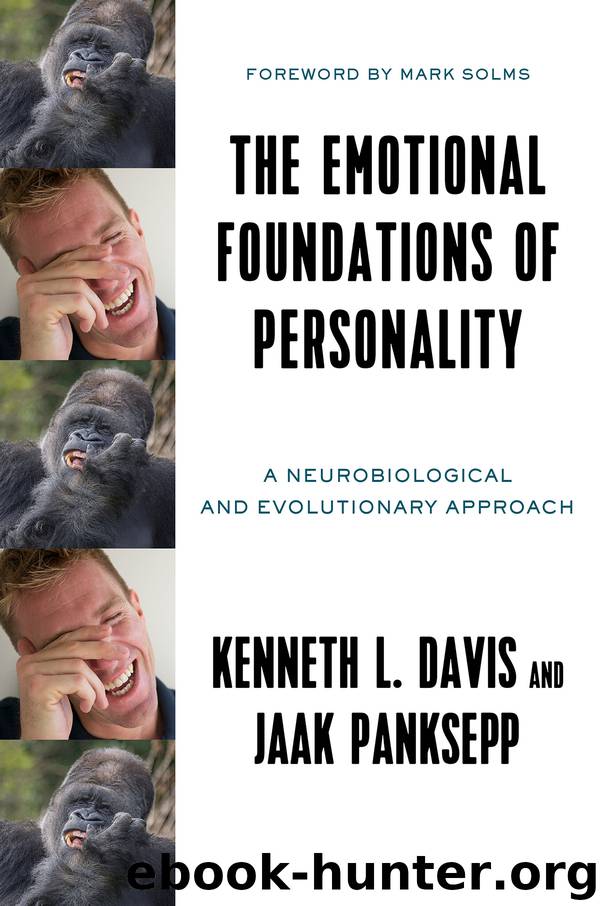The Emotional Foundations of Personality by Kenneth L Davis & Jaak Panksepp

Author:Kenneth L Davis & Jaak Panksepp [Davis, Kenneth L & Panksepp, Jaak]
Language: eng
Format: epub
ISBN: 9780393710588
Publisher: W. W. Norton & Company
Published: 0101-01-01T00:00:00+00:00
A FOUNDATIONAL ISSUE: THE LEXICAL HYPOTHESIS
The lexical hypothesis embraces a faith that the spoken language encompassed a profound wisdom: the ability to describe and communicate all human interpersonal behavior that had been important for survival (for a review, see Saucier & Goldberg, 1996). In reporting his derivation of sixty key variables from the 4,503 trait terms, Cattell wrote that “all aspects of human personality which are or have been of importance, interest, or utility have already become recorded in the substance of language” (1943, p. 483). He later similarly wrote that “by the pressure of urgent necessity, every aspect of one human being’s behavior that is likely to affect another has come to be handled by some verbal symbol” (1957, p. 71). Furthermore, for Cattell, factor analysis was the tool to extract this “latent” understanding of the human experience that was embedded in spoken language. Parenthetically, all this may be true about tertiary-process cognitive elaborations on basic survival issues, but our view is that the primary-process emotional survival themes need to be explicitly addressed for personality scales to be optimally useful to psychiatrists and other mental health professionals.
The scientific problem that Cattell and others hoped the lexical hypothesis with factor analysis would resolve was how many distinct categories of behavior one needed to adequately describe human personality. However, Cattell also dreamed that his factor-analytically derived “source” traits would represent the fundamental “dynamic causes” of human behavior. Yet, as we have already pointed out, this marvelous statistical descriptive system has limitations when it comes to arriving at fundamental primal categories of emotional tendencies. With this statistical tool it is difficult to discern where psychologically relevant primary emotional brain systems end and higher-order tertiary personality elaborations begin. Both of these problems—identifying distinct categories of behavior and identifying the fundamental causes of personality differences—are personality issues that perhaps affective neuroscience can address more accurately than statistical factor analysis. And as soon as one identifies the foundations of personality systems useful for understanding emotional problems, often conceptualized as psychiatric disorders, one has the possibility of bridging basic brain research and clinically relevant human problems in new ways, as we describe in Chapter 18.
Cattell’s Sixteen Personality Factors
Cattell ventured into the personality world armed with a rich lexical hypothesis and Thurstone’s “improved” factor-analytic methods. Cattell found twelve dimensions that he could observe readily using both self-report questionnaire data (Q-data) and observer ratings (L-data). However, there were four personality dimensions he was only able to find using Q-data, which he then named Q1 through Q4. Cattell published the 16 PF, short for 16 Personality Factors, as summarized in Table 11.1—sometimes using very imaginative “cryptic” terms to describe his scales.
The Underlying Complexity of the Big Five: 16PF Source Traits
Cattell further factor analyzed his sixteen primary factors to reduce the number to eight second-order personality scales (not to be confused with our secondary-process in the Nested BrainMind Hierarchy presented in Chapter 5). Cattell later reported a second-order solution that further simplified personality profiling to five second-order factors that fit the Big Five personality model.
Download
This site does not store any files on its server. We only index and link to content provided by other sites. Please contact the content providers to delete copyright contents if any and email us, we'll remove relevant links or contents immediately.
The Art of Thinking Clearly by Rolf Dobelli(10453)
Mindhunter: Inside the FBI's Elite Serial Crime Unit by John E. Douglas & Mark Olshaker(9320)
Change Your Questions, Change Your Life by Marilee Adams(7759)
Nudge - Improving Decisions about Health, Wealth, and Happiness by Thaler Sunstein(7692)
Mastermind: How to Think Like Sherlock Holmes by Maria Konnikova(7323)
The Power of Now: A Guide to Spiritual Enlightenment by Eckhart Tolle(5752)
Men In Love by Nancy Friday(5234)
Altered Sensations by David Pantalony(5093)
Factfulness: Ten Reasons We're Wrong About the World – and Why Things Are Better Than You Think by Hans Rosling(4732)
The Confidence Code by Katty Kay(4251)
Thinking in Bets by Annie Duke(4218)
Man and His Symbols by Carl Gustav Jung(4130)
The Worm at the Core by Sheldon Solomon(3486)
Why Buddhism is True by Robert Wright(3446)
Liar's Poker by Michael Lewis(3441)
Three Women by Lisa Taddeo(3422)
The Inner Life of Animals by Peter Wohlleben(3309)
Descartes' Error by Antonio Damasio(3270)
How Music Works by David Byrne(3259)
